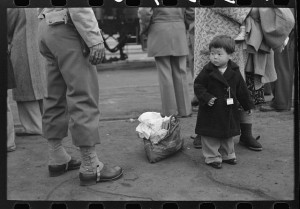By Louis Chan
AsAmNews National Correspondent
75 years after Executive Order 9066 that put more than 110,000 Japanese Americans into incarceration camps, one educator is defending the order.
Dr. Gary Bullert is under intense criticism for an op-ed he wrote in the Tri-City Herald which attempts to answer the question-was the incarceration of West Coast Japanese racist?
Bullert is a professor of political science at Columbia Basin College in Pasco, Washington.
“First, it wasn’t “racism,” but the naked aggression of Imperial Japan that prompted the American response,” wrote Bullert. “Were other Asians, namely the Chinese and Koreans, targeted for racist attacks? Yes — but by the Japanese who treated them as sub-humans as well as American POWs who were systematically brutalized.”
“The American relocation was managed discreetly. For example, of the 130,000 Japanese in Hawaii, only 1,200 to 1,800 were interned. Some 2,263 Japanese college students left the camps in order to attend college on the East Coast. Many were released for jobs. Japanese Americans were recruited for military service. More than 30,000 fought with distinction during the war.”
It’s doubtful those who suffered through the experience of living in horse stalls and other horrendous conditions would describe the evacuation order as “discreet.” Neither would those who served honorably on the 442nd and 100th Infantry Battalion.
Actor and activist George Takei called the article repulsive.
This article claiming Internment was not racist is by Prof. Gary Bullert @CBCollege Let them know it’s repulsive. https://t.co/wekltfYn2H
— George Takei (@GeorgeTakei) January 31, 2017
Kristina West who is from Pasco and currently lives in Tokyo, also felt the need to speak out.
While attending Eastern Washington University, she witnessed first hand the racism Japanese exchange students face.
“People would say, “Speak English” or “Go back to your country,” she wrote in a letter to the editor in the International Examiner. “I heard racial slurs and saw people pull their eyelids back while mimicking an “Asian” accent. I am ashamed that my hometown’s paper and community college give voice to someone who feeds into anti-Japanese American sentiment. I hope, with more attention to this issue, my hometown can learn the truth, and realize that giving a platform to a racist, is also being racist. As the anniversary of Executive Order 9066 approaches and hate crimes against Muslims rise, we must make sure something like this does not happen again.”
Joseph Shoji Lachman countered Bullert’s argument with his own op-ed in the Huffington Post and questioned why reputable news media groups would give his views a forum.
“This is the problem of misguided “balance” and “fairness” in journalism, and to an extent in academia,” wrote Lachman. “While people are free to have opinions, this does not mean that every debate has two equal sides. We do not give similar media representation to people who argue that slavery was a necessary evil for this reason, and the Incarceration of Japanese American is no different. Bullert was demanding equal time and space for a position that is beyond indefensible.”
KVEW-TV also came under criticism for giving Bullert’s arguments coverage.
@aaja @aajanewengland @aajaseattle @RafuShimpo @GilAsakawa @DenshoProject @jaclseattle @nichibei @manzanarcomm @minidokapilgrim @AsAmNews https://t.co/QrYxK0UOHX
— Keiko (@keikoinboston) February 19, 2017
(Editor’s note: An earlier version of this story incorrectly stated that Kristina West taught at Eastern Washington University)
AsAmNews has Asian America in its heart. We’re an all-volunteer effort of dedicated staff and interns. You can show your support by liking our Facebook page at www.facebook.com/asamnews, following us on Twitter, sharing our stories, interning or joining our staff


RE: Defense of incarceration camp as “not racist” slammed. He should read No-No Boy!